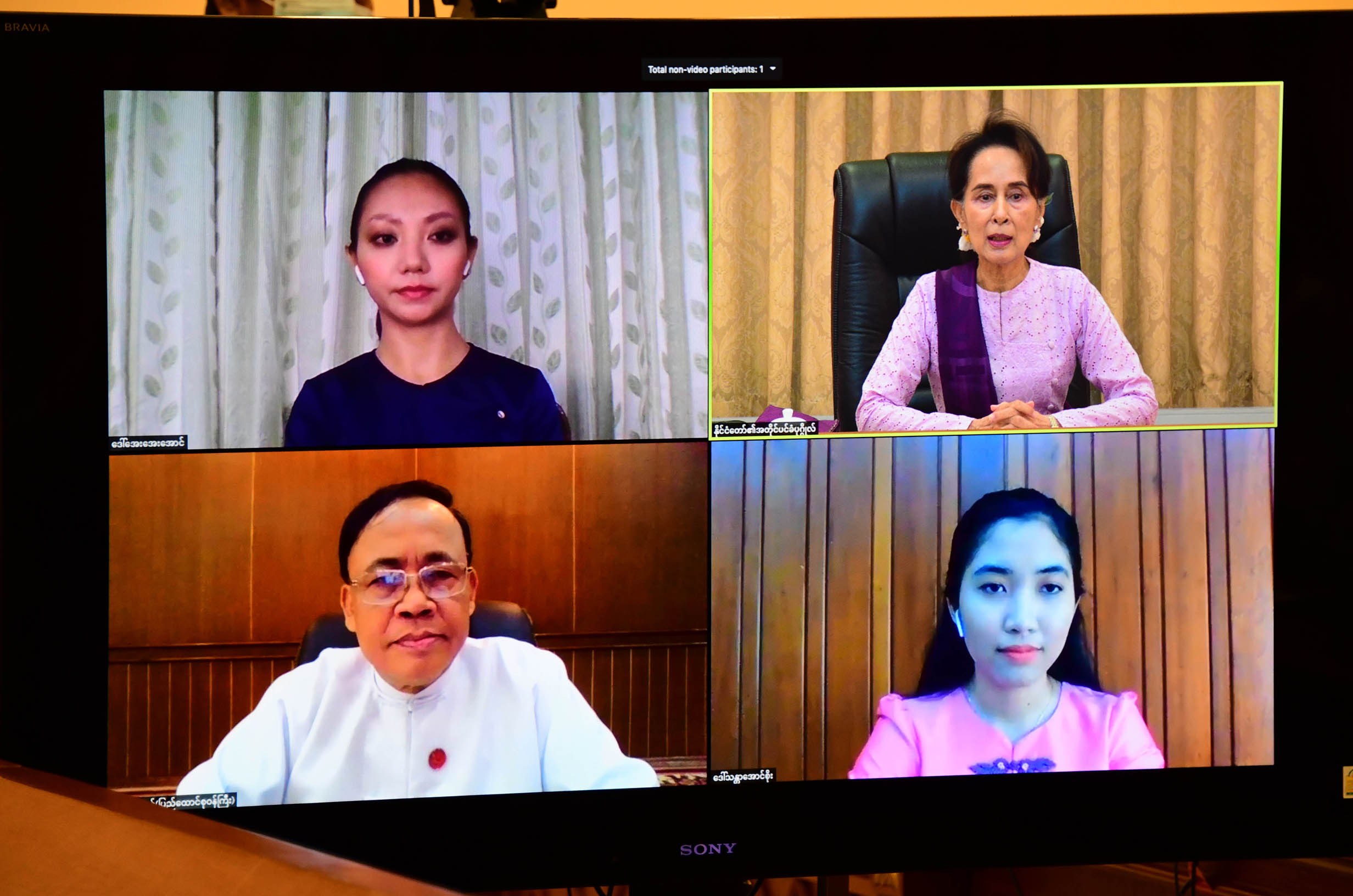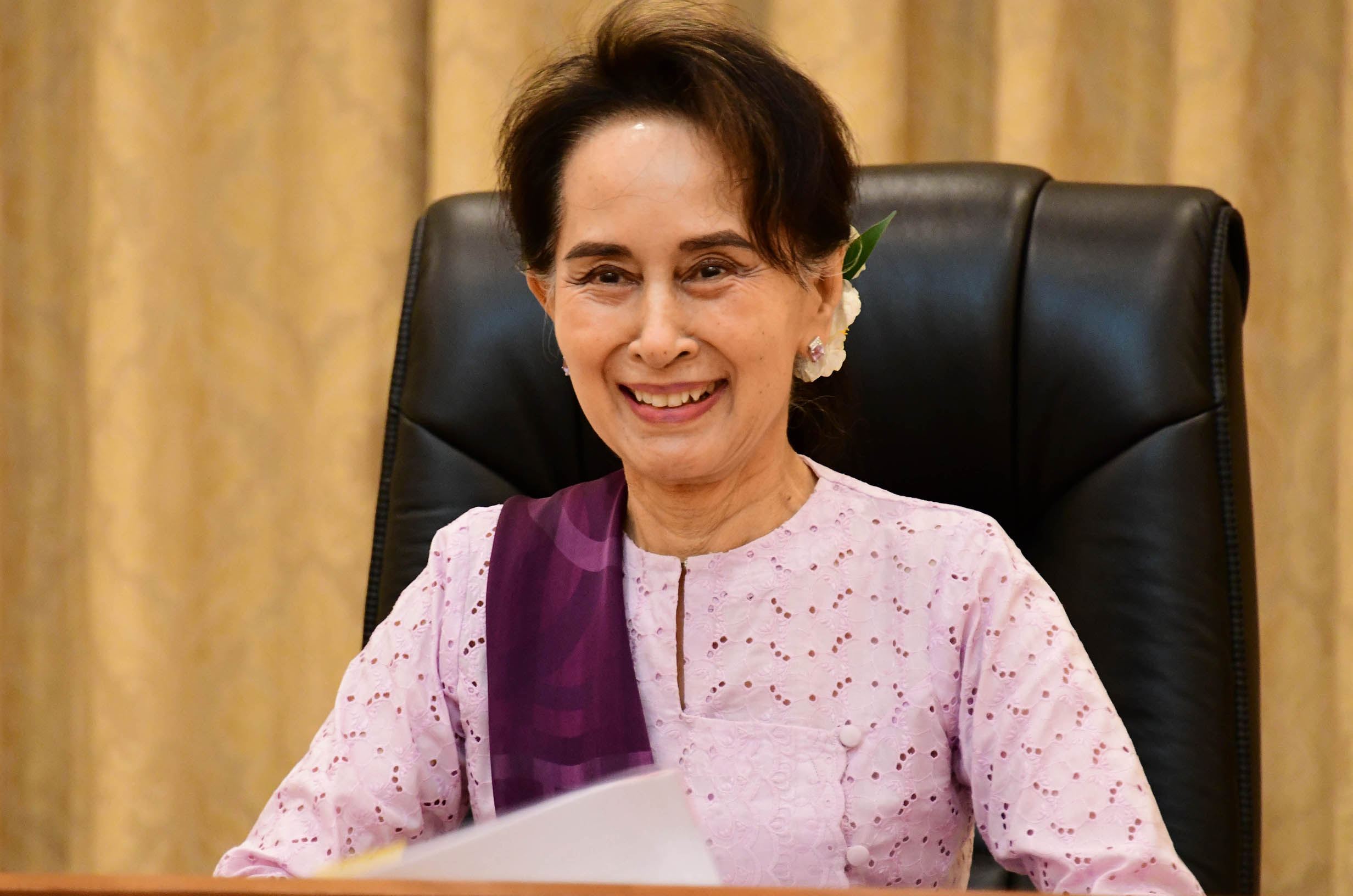15 July
State Counsellor Daw Aung San Suu Kyi in her capacity as Chairperson of the National-Level Central Committee for Prevention, Control and Treatment of Coronavirus Disease 2019 (COVID-19) held a videoconference at 10:00 am yesterday morning from the Presidential Palace about bringing home Myanmar nationals from various countries during the COVID period.
The persons who participated in the discussions were:
U Kyaw Tin, Union Minister from the Ministry of International Cooperation, a returnee from India Ma Aye Aye Aung and a returnee from Australia Ma Thanda Aung Soe.
First of all, State Counsellor Daw Aung San Suu Kyi said, she wished to discuss on Myanmar nationals who have returned from aboard; especially those who have to enter quarantine related to COVID. Since Myanmar nationals were living in many countries, they have to be brought back home from these countries respectively. In this repatriation effort, commercial flights were not running. The reason these flights had to be stopped was that it would have been very difficult to contain the spread of this disease if people were given the freedom to go as they wished during the COVID outbreak.
Because commercial flights had stopped, the Union Government had permitted Special flights and Relief flights. Special flights were used to carry cargo and passengers for government projects; flights needed for unavoidable diplomatic matters, and for the transport of medicines and other important cargoes. Relief flights have been used mainly for bringing home Myanmar nationals. It has been possible to bring back home some Myanmar nationals on flights carrying medical supplies. These matters are being arranged mainly by the Ministry for International Cooperation. These matters have to be organized and conducted with the coordination of the Protocol Department, Ministry of Transport and Communications, and with the permission of the Ministry of Health and Sports. In the final analysis, the directive of the Ministry of Health and Sports is the key.
Union Minister U Kyaw Tin discussed that the Ministry of International Cooperation worked together with the Ministry of Health and Sports in control measures against COVID-19 in line with the rules of the World Health Organization, and the government has formed the ministerial level central committee even before the WHO declared the pandemic as the global emergency.
Fifty-nine Myanmar students, out of 61 stranded in Wuhan city of China, were brought back by the first relief flight on 2 February. The remaining two students were repatriated through India where they spent quarantine.
A cargo flight was arranged to bring back Myanmar nationals stranded in Thai airport in April. International flights were suspended on 30 April, however, the central committee arranged cargo flights and relief flights for the foreigners stranded in the country. International communities recognized this work.
The Union Minister also explained the repatriation programmes for Myanmar nationals who wanted to come back home for various reasons. Myanmar missions in foreign countries coordinated with the relevant officials in those countries for the return of nationals.
Over 8,000 Myanmar nationals were repatriated by 56 relief flights from foreign countries, and arrangements are being made to bring back about 1,800 persons by 13 relief flights in August.
He continued to say that the repatriation programmes are adjusted with the capacity of quarantine facilities in the country as the central committee has limited only 700 persons to bring back home each week.
He remarked that the Myanmar missions abroad gained the trust of its citizens during the pandemic crisis as they reportedly felt safe for medical treatments quarantine programmes.
Ma Aye Aye Aung who returned from India recounted her experiences in India where she visited for learning Yoga techniques in Mumbai.
She also talked about the first lockdown of India on 24 March, panic buying of people, suspension of all the businesses in Mumbai with the highest number of domestic migrant workers in India and hundreds of thousands of unemployment rates amid the pandemic.
She also said about insufficient capacity of public hospitals to accommodate patients; as the cost of medical treatment was ten-time in private hospitals, some patients suffered from depression to commit suicide.
Ma Aye Aye Aung also talked about the second lockdown in Mumbai, a sky-high electricity bill 20-times the usual cost and an increase of two to three times of commodity prices despite the government’s control measures.
She finally returned home through Chennai by the relief flight on 28 May.
She expressed the improvement of the healthcare system in Myanmar and facilities of quarantine centres.
Ma Thandar Aung Soe who returned from Australia said that when she arrived in Sydney, there was no social distancing or no use of facial masks to prevent COVID-19.
After the WHO declared the viral disease as the pandemic on 11 March, the spread of this disease increased gradually across the world.
She was also stranded in Australia due to suspension of international flights and no transit country to return home.
She recounted her experiences on the strict lockdown in Australia, directives for home quarantine to the young persons with mild symptoms, and the relief plan for its citizens like in Myanmar.
Ma Thandar Aung Soe also expressed assistance of Myanmar Embassy in Canberra for her return to home, remarked Myanmar has made better control programmes of COVID-19 and advised for specific quarantine facilities appropriate for any gender and age levels.
In responding to the discussions, the State Counsellor said an “embassy” should be a refuge for Myanmar nationals living abroad; she said it was her wish that Myanmar nationals should have a feeling of trust that they would get help from the embassy in time of need.
There were also many Myanmar nationals living in Malaysia; some do not have adequate documentary evidence to prove their nationality so a review process had to be done. She said Myanmar authorities had to consider and review the nature of healthcare treatment they had received; the rules and regulations under which they had lived and if there were any persons who were tested positive. In cases where there were positives cases, these people were sent to the hospital; this type of procedure was not done in all countries; in some rich countries, people who tested positive were asked to stay at home instead of being sent to hospital; they were asked to contact the hospital only when the case became more serious.
In Myanmar returnees were put into quarantine and sent to hospital if they were tested positive; we need our hospitals to have adequate medical supplies and medical staff; that was the reason why we could not permit returnees to return in large numbers; we need adequate quarantine centres and hospitals to take care of infected persons according to a pre-calculated percentage.
If a person is found to be infected with COVID, this person was immediately sent to the hospital for medical care and treatment; if the patient has other diseases, this person was admitted to hospital in accordance with the requirement of the disease. It would be very difficult for the hospitals to receive elderly people who do not have any disease and take care of them; the hospitals were doing their best to give adequate healthcare and treatment to those who are infected; if a person has been admitted into a hospital, medical treatment is given whether the patient is old or young without discrimination. In most cases, children get infected from their parents; infected children got admitted to the hospital together with their parents, elder brother or elder sister; children feel lonely only to a certain extent. She added that she would give necessary instructions to give special care for those who are disabled and those who have gender issues.
She said a policy to give special care to persons with special vulnerabilities was being implemented.
In giving her concluding remarks the State Counsellor said that the COVID committee had been formed at the end of January and they began their activities beginning from early February; she thought that the reason Myanmar had been able to come this far was because of early planning and early action; for example, the Ministry of Health and Sports formulated plans beginning from 4th January and this could be said to be very early; at that time other countries were still treating COVID in a very nonchalant manner; because the Ministry of Health and Sports had made plans in an early manner when the WHO declared COVID as a pandemic, Myanmar had already taken COVID-related steps for two months already. In taking measures related to COVID, the government considered and took action for health as well as for the economic impacts.
Once there was a COVID outbreak, there were bound to be economic impacts, so we took measures to make advance preparations to make sure that the impact on the people would be minimal as much as possible. We made plans beginning from February to lessen the impact as much as possible on those who became unemployed and so that they could get back jobs as early as possible; efforts were made to implement projects and programmes related to the construction and agriculture sector as quickly as possible.
If we looked at it from an over-all view, people’s cooperation and participation is the key. That is the reason why we have been saying all the time “People are the key”. If the people did not follow the rules and regulations, everything would come to nought, even if we had issued the best of rules or regulations. She said she wanted everyone to follow the rules and regulations issued by the Ministry of Health and Sports as a way of showing gratitude to this ministry. The COVID matter is not yet over; it was difficult to say when it would be over; it is learnt that tests were being made to develop curative vaccines; it was not possible to know how fast they would be able to develop the vaccines; normally you need two years to test a vaccine; because COVID is an emergency, they are testing within a short time-frame; conducting tests within a short time-frame has its own dangers; they might not have sufficient time to ensure that it was free from dangers; if there was not enough time there could be bad effects.
Among those nationals who are in foreign countries, there were many who wanted to return home; yesterday there were over 500 persons who came back from Thailand and over 130 who came back from China. The number of persons coming back home has declined; the last three weeks, the number of returnees was 1,000 every day; it was difficult to say when this process of Myanmar nationals returning home would stop; a small number would be returning on a regular basis; we have to put them all into quarantine; we have to give medical treatment to those who need treatment. She said she wanted those who have the experience to assist in this process; the main thing is to remind everyone not to be careless and to follow the rules and regulations; we have to control and prevent COVID by issuing health rules and regulations; it was more difficult to give treatment after the COVID has spread and more costly; there was no guarantee that a person cannot be re-infected after being infected with the COVID. As far as it was known at the moment, a person could get re-infected. All of you should take care of this matter.
She ended the video conference by thanking all the participants and gave blessings for good health and a speedy victory over COVID.
MNA (Translated by Kyaw Myaing, Aung Khin)



